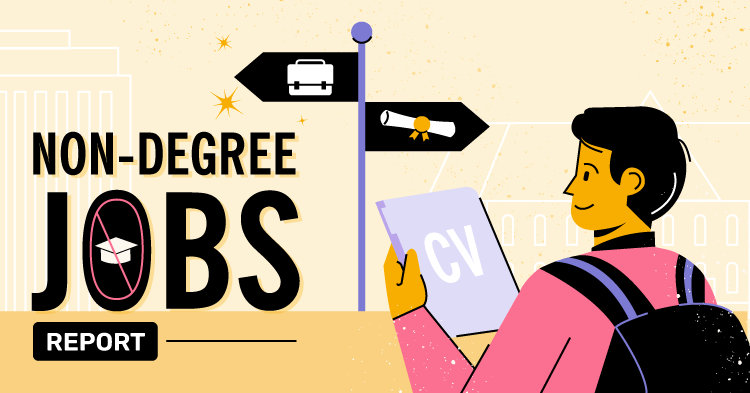In recent years, the ‘degree inflation’ phenomenon has meant that seemingly every other available job in the U.S. required a college degree, despite the fact that a lot of people already in those jobs didn’t have one. The good news is that the situation seems to be improving, with the number of job posts that didn’t require candidates to have college degrees increasing by 36% between 2019 and 2022.
Still, the work opportunities available to people who don’t have a college degree can differ drastically depending on where they live. Bustling cities, for instance, are often associated with highly educated workforces. It tracks, then, that city-dwellers without college degrees face fierce competition for available entry-level work, jobs that typically don’t require a college education.
But there’s good news: In many cities, workers without college degrees can find well-paying work. No degree, no problem!
So which cities are best for job searchers, and which are the most competitive? This begs the question: which cities in the U.S. are the best and worst for people without college degrees? CashNetUSA went in search of the answer, using the local number of non-graduates per a single entry-level job post as a proxy.
About This Study
For the most populated cities and urban areas in the U.S., we used the U.S. Census Bureau and publicly available job adverts from Indeed to calculate the ratio of local people with high school as the maximum level of education for every entry-level job role.
Key Insights
- Fort Myers in Florida has the best job market for non-graduates, counting 1.2 non-college-degree holders per entry-level role.
- In contrast, New York City is the most competitive city in the U.S. for people without college degrees — locally, there are 41.48 non-graduates for every entry-level role.
- On a state level, Maine (3.05 non-graduates per entry-level job), West Virginia (3.37), and South Carolina (3.49) are the best states to find a job without a college degree.
- New York (21.94 non-graduates per entry-level job), California (13.58) and New Jersey (12.59) are the most competitive states for non-degree holders.
Fort Myers in Florida Has the Best Job Market for Job-Seekers Without a College Degree
Fort Myers in Florida is home to the best job market for people without college degrees, counting only 1.2 non-graduates per entry-level job. Florida is one of the most affected states by labor shortage across the U.S., locally highlighted by a Fort Myers job fair that struggled to attract job hunters in 2022.
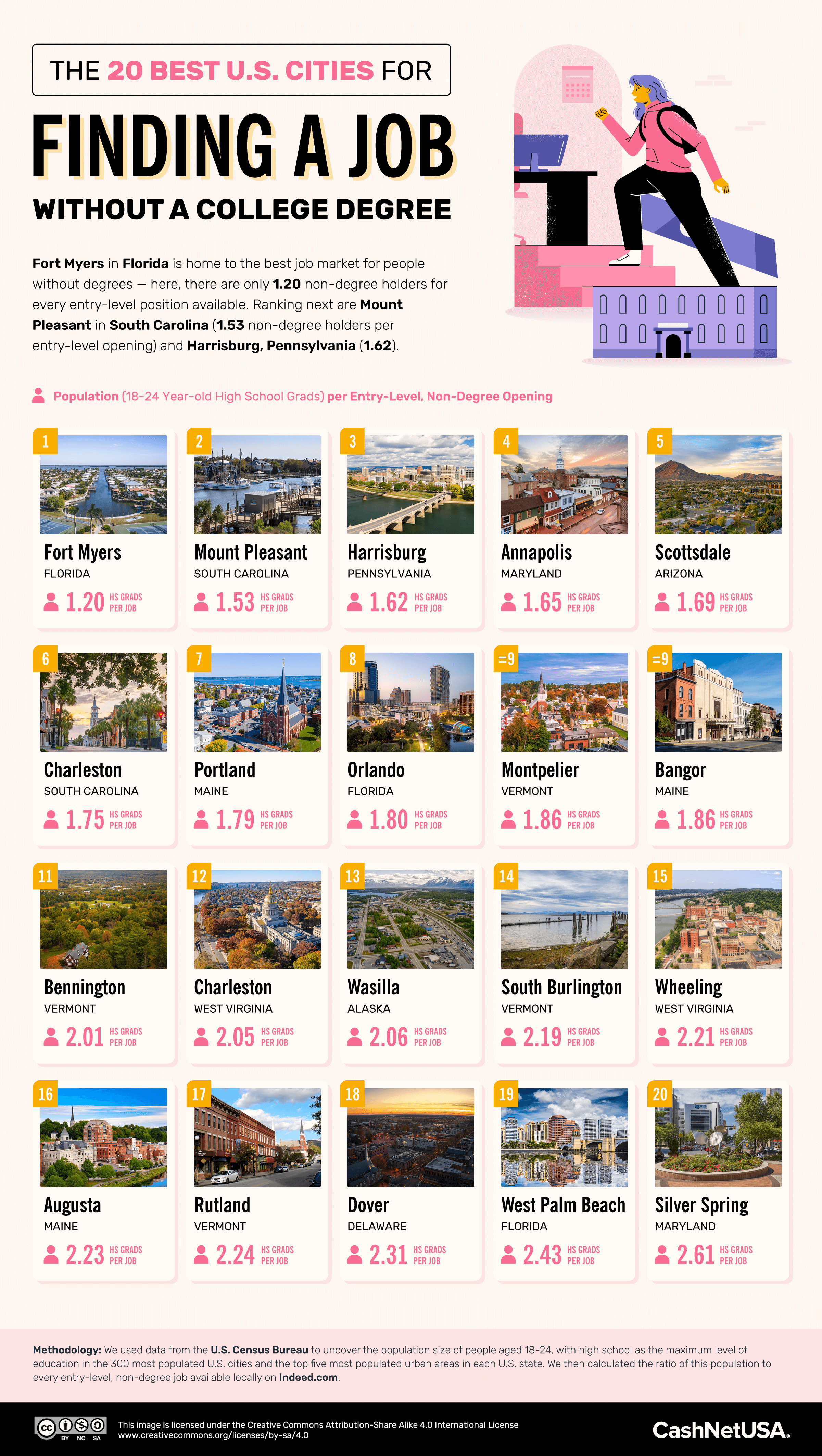
Counting 1.53 non-graduates for every available entry-level job, Mount Pleasant in South Carolina comes next, a city attracting an influx of remote workers from the Northeast and further afield. Four cities in Vermont also make the ranking, a state in which a shortage of available housing is seeing candidates having to turn down job offers.
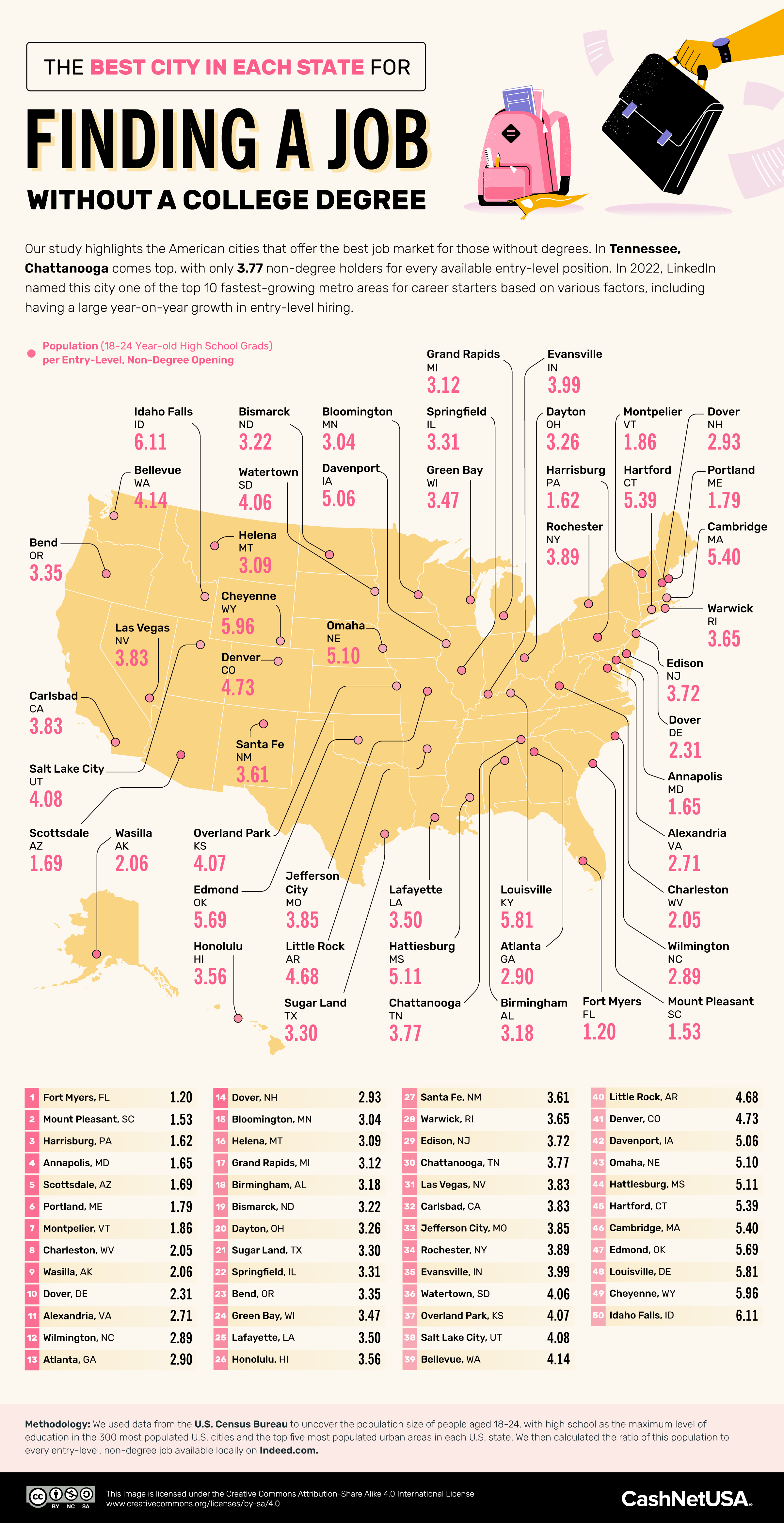
Above, we’ve mapped the city in each state with the least competitive job market for non-degree holders. Even the most competitive states have one — take New York, for example: in Rochester, there are only 3.89 job hunters without college degrees for every entry-level position. Meanwhile, in California, Carlsbad takes the title, counting 3.83 non-graduates per entry-level job.
New York is the Worst State for Job Hunters without College Degrees
New York leads our ranking for the worst (or most competitive) states for people without college degrees to apply for entry-level roles, counting 21.94 local non-degree holders for every job opening. Considering it’s where you’ll find New York City — the most attractive city in the country for young professionals — it’s perhaps no surprise that this state offers fierce competition for any job seeker, degree or no degree.
Similarly, California (13.58 non-degree holders per entry-level role) comes second, a popular state for any job seeker, considering it’s been found by Oxfam to be the best state in which to work.
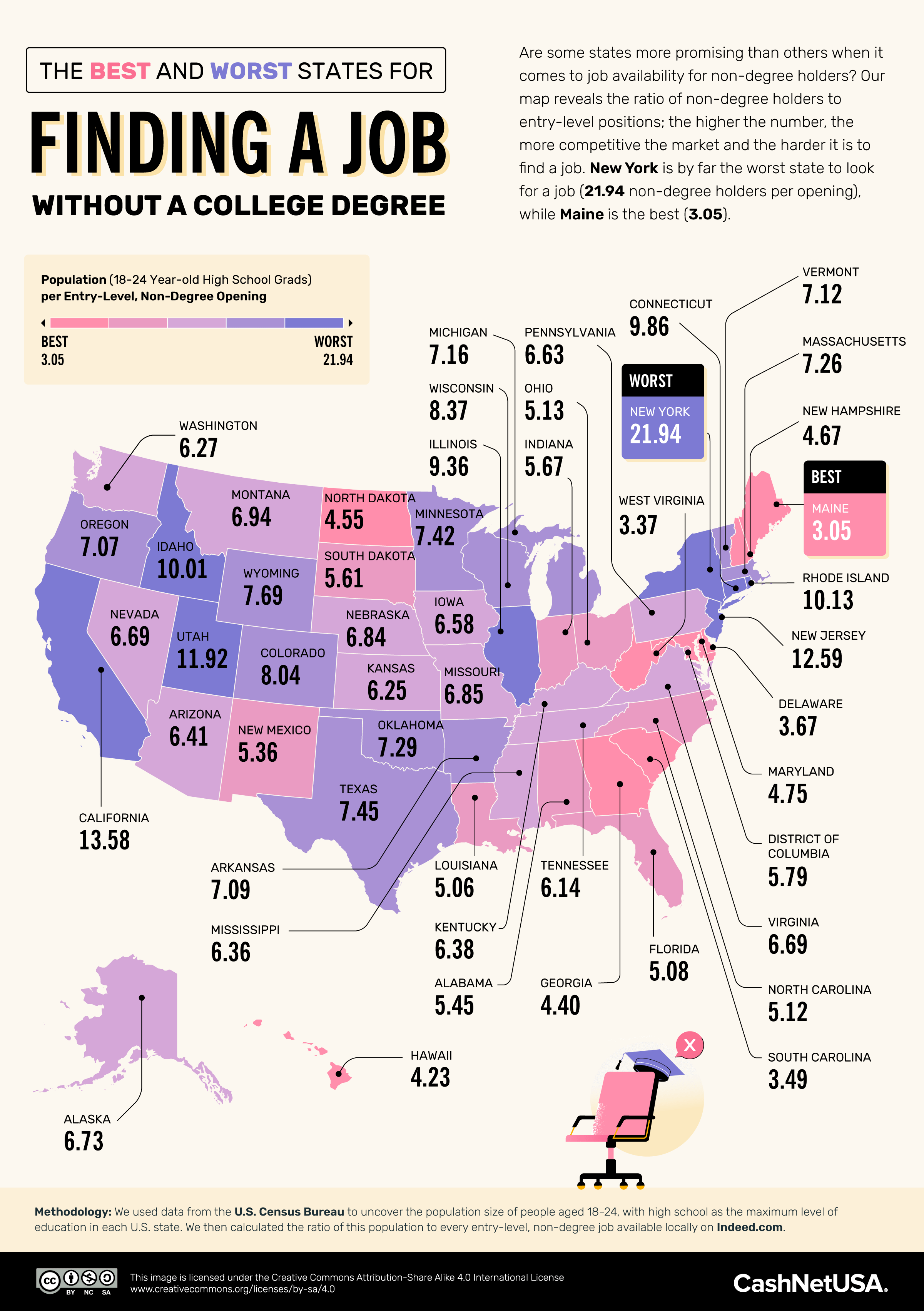
What’s perhaps not as predictable is New Jersey in third place, a state in which there are 12.59 people without college degrees per entry-level role. Not only has New Jersey recently experienced the highest year-on-year unemployment rate increase of any state — pushing up competition for all job seekers — but there’s a local mismatch between skilled employees and job openings. As the Heldrich Center writes:
“Middle-skill jobs — those that require some training or education beyond high school but less than a four-year degree — make up the largest share of New Jersey’s labor market; yet, only 37 percent of New Jersey’s workforce are trained or educated for middle-skill jobs.”
New York City Has the Worst Job Market for People without a College Degree
New York is the worst (or most competitive) U.S. city for job hunters without college degrees, home to 41.48 non-degree holders for every entry-level job. While half of the city’s workforce doesn’t have a college degree, 17% of local workers have a college degree but work in an occupation that doesn’t typically require one. This means that job hunters without college degrees are competing against college graduates as well as fellow non-degree holders.
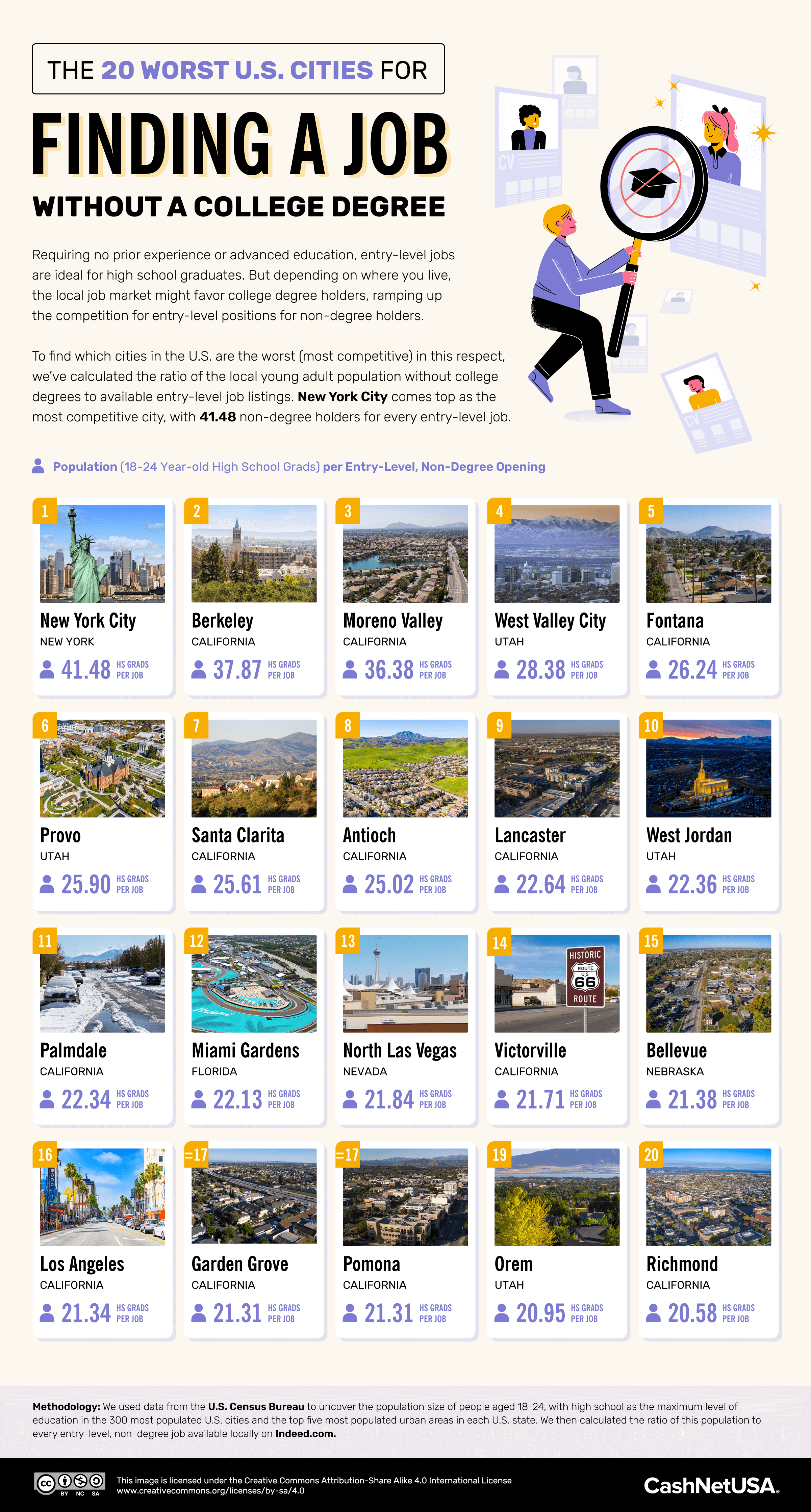
The rest of the ranking is dominated by cities in California, led by Berkeley (37.87 non-degree holders per entry-level job). As one of the most educated cities in the U.S., it’s likely that — like in New York City — non-degree holders are also up against college graduates on the job hunt. West Valley City in Utah (28.38) places fourth, a city where workers without college degrees are in the majority.
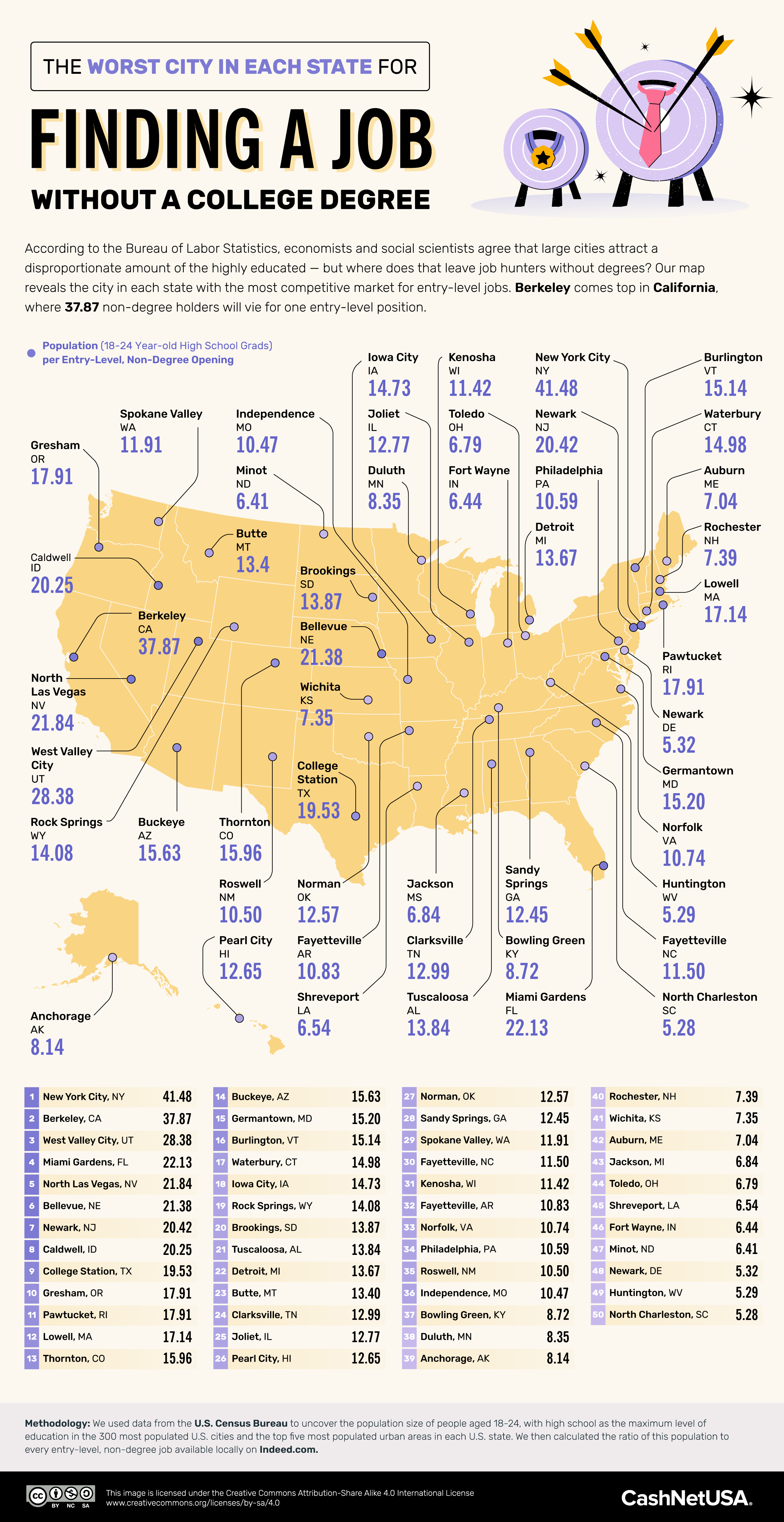
Our map above reveals the city with the most competitive job market within each state. Iowa City comes top in Iowa (14.73 non-degree holders per entry-level job), where competition may be fierce because 87.8% of entry-level jobs offer a salary higher than the state median. Likewise, Sandy Springs in Georgia (12.45) has been named among the best cities in the nation in which to start a career.
Tips for Landing a Job Without a College Degree
If you haven’t graduated college, you’re actually in the majority: only 37.7% of Americans have been educated to a bachelor’s degree level. That being said, sometimes it can seem like every other job opening requires a degree. So, how can you supercharge your search for the perfect role without one?
1. Find relevant work experience
If there’s anything more important to an employer than academic credentials, it’s work experience. In fact, 37% of employers rank relevant work experience as the most important qualification when considering candidates. It doesn’t have to be a paid job, either; take a look at volunteering opportunities near you that would allow you to cultivate the skills and industry know-how that an employer in your target career would appreciate seeing on your resume.
2. Pursue other qualifications online
The internet has made it easier than ever for people to learn skills and train in a specific field for free or at a much cheaper rate than a fully-fledged university. If you’re not sure where to start, think about what kind of hard or soft skills a future employee in your target field would value. You can then browse through the vast libraries of the likes of Coursera, Udemy or LinkedIn Learning, or the courses offered by Harvard or Stanford Universities, to start studying and gain resume-boosting certifications.
3. Create a solid social media presence
In a world where 70% of employers research a job candidate’s social media as part of their screening process, every job hunter — with or without a degree — should make sure their public social media profiles present a professional image. But if you don’t have a degree, social media is another way you can showcase your passion for and knowledge about a particular industry. You can use LinkedIn, for example, to start engaging conversations about industry insights and trends, which has the added benefit of opening up your network to potential employers.
TIP: Create content on a social media platform like TikTok to solidify yourself as an up-and-coming voice within your chosen industry. You could demonstrate your expertise on a topic, showcase your hard skills or provide commentary on industry trends.
Our Methodology
We retrieved the local population size of people aged 18-24 with high school as the maximum level of education from the American Community Survey conducted by the U.S. Census Bureau for the 300 most populated cities in the U.S. and the top five most populated cities and urban areas in each U.S. state.
For each city and U.S. state, we then used Indeed.com to find the number of entry-level jobs advertised for high school graduates as the maximum educational level required. This enabled us to calculate the local ratio of high school graduates per available entry-level job so we could rank the most and least competitive cities and states for job hunters without college degrees.
Observations:
- Our data was gathered in February 2024.
- The numbers for the high school graduates population were taken from 2022: ACS 5-Year Estimates Subject Tables.
